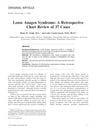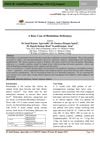 19 citations,
January 2011 in “Clinics”
19 citations,
January 2011 in “Clinics” A young woman with a rare hair loss condition improved with steroid and biotin treatment.
 13 citations,
July 2016 in “Pediatric Dermatology”
13 citations,
July 2016 in “Pediatric Dermatology” Loose Anagen Syndrome is more common in females and may be inherited, often confused with other hair disorders, and lacks evidence for biotin treatment effectiveness.
 10 citations,
April 2020 in “Clinics in Dermatology”
10 citations,
April 2020 in “Clinics in Dermatology” Biotin supplements improved skin and hair problems in a girl with biotinidase deficiency.
 9 citations,
July 2014 in “PubMed”
9 citations,
July 2014 in “PubMed” The review doesn't clearly say if biotin, caffeine, melatonin, a marine extract, and zinc are effective for treating hair loss.
9 citations,
October 1946 in “Experimental biology and medicine” Rats fed soybean oil meal lost hair, but adding inositol, biotin, cystine, or methionine to their diet prevented this and improved growth.
 5 citations,
December 1942 in “Journal of the American Medical Association”
5 citations,
December 1942 in “Journal of the American Medical Association” Choline and biotin are important for liver health and preventing certain deficiencies in animals, and more research is needed to understand their benefits in humans.
4 citations,
August 2021 in “Pediatric dermatology” Biotin, alone or with minoxidil, effectively treats short anagen syndrome.
4 citations,
July 2019 in “Clinical and experimental dermatology” Early diagnosis and biotin treatment are crucial for infants with biotinidase deficiency to prevent severe complications.
 3 citations,
August 2021 in “Clinics in Dermatology”
3 citations,
August 2021 in “Clinics in Dermatology” Minoxidil is the main over-the-counter treatment for hair loss, with other options like finasteride, latanoprost, retinoic acid, antioxidants, biotin, nutraceuticals, and platelet-rich plasma therapy also showing promise.
 2 citations,
August 2022 in “Clinical Case Reports”
2 citations,
August 2022 in “Clinical Case Reports” A 17-year-old girl had severe, on-and-off hair loss, likely due to COVID-19. She was treated with Vitamin D3, biotin, and other supplements, and saw some improvement within a month.
1 citations,
July 2017 in “Skin appendage disorders” A 9-year-old Hispanic girl has Uncombable Hair Syndrome, which may improve with age and biotin treatment.
March 2023 in “Mağallaẗ wāsit li-l-ʿulūm wa-al-ṭibb” A rare biotin deficiency in an Iraqi family caused severe symptoms but was successfully treated with lifelong biotin.
 January 2023 in “Dermatologìâ ta venerologìâ”
January 2023 in “Dermatologìâ ta venerologìâ” Biotin tablets and shampoo effectively stop hair loss and restore hair function in women.
 September 2022 in “Polish Hyperbaric Research”
September 2022 in “Polish Hyperbaric Research” Some treatments for hair loss, like finasteride, biotin, and minoxidil, can be effective, but their success varies by individual case.
 October 2021 in “Interfaces Científicas”
October 2021 in “Interfaces Científicas” Nutricosmetics for hair treatment often contain biotin, pyridoxine, zinc, and other nutrients, but more research and professional guidance are needed for their use.
 August 2021 in “Journal of medical science and clinical research”
August 2021 in “Journal of medical science and clinical research” An infant with seizures and hair loss was diagnosed with biotinidase deficiency and treated successfully with biotin.
 January 2020 in “Medpulse International Journal of General Medicine/Medpulse International Journal of Medicine”
January 2020 in “Medpulse International Journal of General Medicine/Medpulse International Journal of Medicine” Premature graying of hair is often linked with other health issues, but treatment with biotin, zinc, and calcium pantothenate is not very effective.
 December 2010 in “Bariatric Nursing and Surgical Patient Care”
December 2010 in “Bariatric Nursing and Surgical Patient Care” Hair loss after bariatric surgery can be reduced by staying hydrated, eating enough protein, taking vitamins, managing stress, and possibly using biotin.
February 1994 in “Neuroscience letters” People need different amounts of biotin based on age and it's important for health, with many foods providing enough.
March 1993 in “Neuroscience letters” Biotin is important for metabolism, with specific daily intake recommendations, and deficiency can cause health problems.
September 1989 in “Neuroscience letters” People need different amounts of biotin based on age, and not getting enough can cause health problems.
1 citations,
May 2022 in “The FASEB journal” The document concludes that biotin, folate, and RGD peptides are promising for targeting cancer cells with prodrugs, but the conjugates are not yet tested for use.
 239 citations,
July 2002 in “Clinical and Experimental Dermatology”
239 citations,
July 2002 in “Clinical and Experimental Dermatology” Low iron and L-lysine levels can cause hair loss in women, and increasing these nutrients can reduce hair shedding.
 134 citations,
December 2018 in “Dermatology and Therapy”
134 citations,
December 2018 in “Dermatology and Therapy” Some vitamins and minerals like vitamin D and iron can help with certain types of hair loss, but more research is needed for others.
 79 citations,
January 2017 in “Dermatology practical & conceptual”
79 citations,
January 2017 in “Dermatology practical & conceptual” Correcting nutrient deficiencies may help with hair loss, but the benefits of supplements without a deficiency are uncertain and could be harmful.
 70 citations,
June 2010 in “Clinics in Dermatology”
70 citations,
June 2010 in “Clinics in Dermatology” Certain groups may need vitamin supplements to improve hair health and prevent other health problems.
66 citations,
November 1997 in “Nutrition” One-third of patients on home nutrition had micronutrient deficiencies, with iron deficiency being most common, but serious issues were rare.
 65 citations,
October 2018 in “Frontiers in cellular and infection microbiology”
65 citations,
October 2018 in “Frontiers in cellular and infection microbiology” Certain bacteria and fungi are linked to healthy scalps and dandruff, suggesting that the scalp's microbial balance affects its health.
 40 citations,
August 2018 in “Skin appendage disorders”
40 citations,
August 2018 in “Skin appendage disorders” Some alternative treatments for hair loss might work, but more research is needed.
 27 citations,
September 2017 in “Journal of Medicinal Food”
27 citations,
September 2017 in “Journal of Medicinal Food” Annurca apple supplement safely increases hair growth and keratin in humans.




















